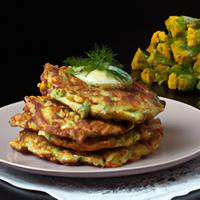
1 serving (100 grams) contains 200 calories, 10.0 grams of protein, 15.0 grams of fat, and 10.0 grams of carbohydrates.

Log this food in SnapCalorie

Nutrition Information
Calories |
476.2 | ||
|---|---|---|---|
% Daily Value* |
|||
| Total Fat | 35.7 g | 45% | |
| Saturated Fat | 11.9 g | 59% | |
| Polyunsaturated Fat | 0 g | ||
| Cholesterol | 357.1 mg | 119% | |
| Sodium | 714.3 mg | 31% | |
| Total Carbohydrates | 23.8 g | 8% | |
| Dietary Fiber | 1.2 g | 4% | |
| Sugars | 2.4 g | ||
| protein | 23.8 g | 47% | |
| Vitamin D | 95.2 mcg | 476% | |
| Calcium | 119.0 mg | 9% | |
| Iron | 3.6 mg | 20% | |
| Potassium | 357.1 mg | 7% | |
* Percent Daily Values are based on a 2,000 calorie diet. Your daily values may be higher or lower depending on your calorie needs.
Food Attributes
Source of Calories
About Egg fritters
Egg fritters are a delicious and versatile dish often enjoyed as a snack or light meal. Originating from various cuisines around the world, they are commonly made by whisking eggs with flour, seasoning, and sometimes finely chopped vegetables, herbs, or spices to create a batter. The mixture is then shallow-fried or deep-fried until golden and crisp. Depending on the ingredients used, egg fritters can provide a good source of protein, essential vitamins, and minerals from eggs and added vegetables. However, frying may increase the fat and calorie content, making them less ideal for those monitoring their intake of saturated fats or calories. To create a healthier version, consider baking them or using healthier oils for frying. Popular for their simplicity and flavor, egg fritters can be adapted to fit a variety of dietary preferences and serve as a satisfying way to incorporate eggs into your diet.



